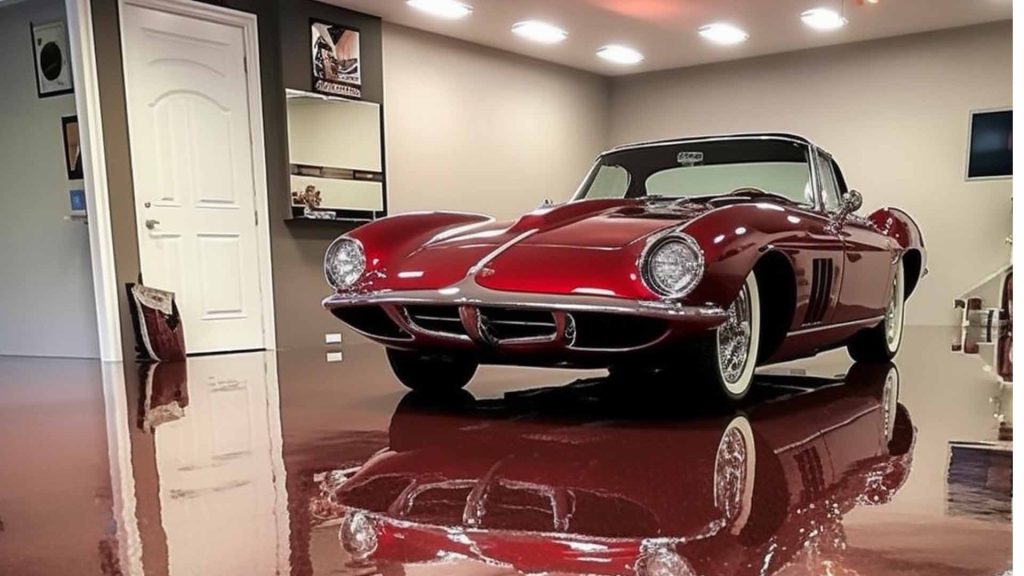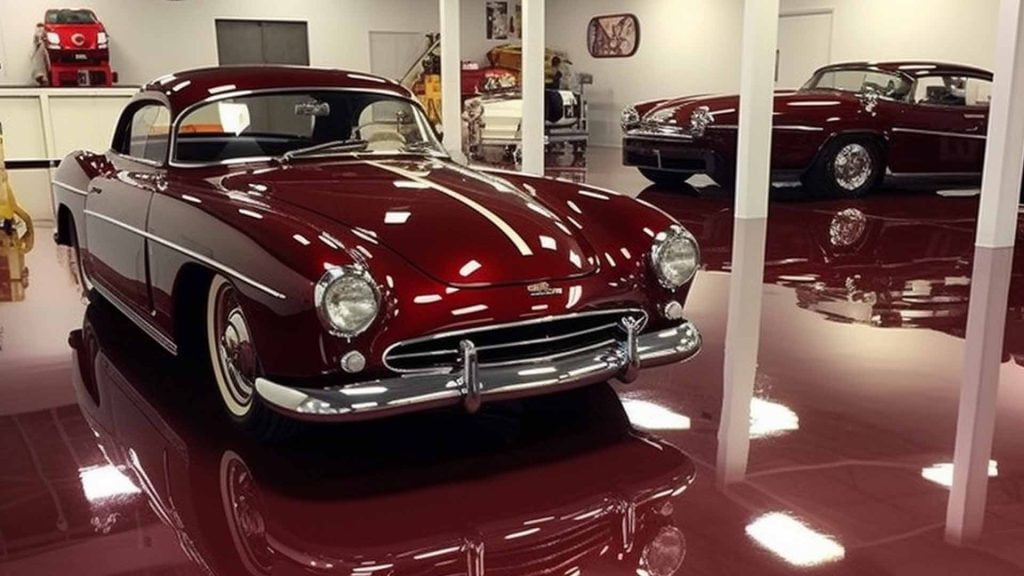Garage floors are subjected to various types of wear and tear, including dirt, grease, automotive fluids, and temperature fluctuations. Upgrading garage floor protection is essential to maintain its appearance and durability. Among the different options available in the market for garage floor protection, polyaspartic floor coating is considered the best choice as it creates a strong bond with concrete, making it impermeable to damage.
Epoxy floor coating, floor tiles, and concrete resurfacers are other options that can provide adequate protection for garage floors. However, some options such as garage floor coverings offer limited protection. In this article, we will provide a ranking of nine garage floor protection options based on their effectiveness and durability. The ranking list will start with the best option and end with the worst option. This guide will help homeowners make informed decisions when upgrading their garage floors’ protection while ensuring the most effective solution for their needs within budget constraints.
Polyaspartic Coatings
In light of the detrimental effects of dirt, dust, grease, and other substances on garage floors, it is imperative to consider upgrading their protection with the best available option – polyaspartic coatings. These coatings create a powerful bond with concrete, making it impervious to damage caused by temperature fluctuations, automotive fluids, household chemical spills, hot tires, and road salt. Polyaspartic coatings are known for their exceptional durability and resistance to abrasions, impacts, chemicals, and permanent markings.
The application process for polyaspartic floor coatings involves several steps that require careful preparation of the surface. Concrete must be cleaned thoroughly before applying the coating to ensure optimal bonding. The curing time for polyaspartic coatings is relatively short compared to epoxy floor coatings; they can be applied in a day and last for years. Maintenance is minimal as polyaspartic floorings resist stains and are easy to clean.
Although polyaspartic coatings are generally more expensive than other garage floor protection options like epoxy flooring or interlocking tiles upfront, they are cost-effective in the long run due to their durability and low maintenance requirements. Additionally, they offer excellent resistance against UV radiation that can cause discoloration or fading over time.
Overall, choosing a polyaspartic coating for your garage flooring provides various advantages such as superior strength and resistance against wear-and-tear. With its quick application process and minimal maintenance requirements coupled with exceptional durability against harsh conditions such as chemicals or UV radiation makes it an ideal choice for homeowners who want top-notch protection without breaking the bank.
Epoxy Coatings
Epoxy coatings, although commonly used for garage floors, have been shown to fall short in terms of both protection and appearance when compared to polyaspartic coatings. While epoxy coatings do offer some advantages such as being cost-effective and relatively easy to install, they lack the exceptional durability and weather resistance that polyaspartic coatings provide. This makes them more susceptible to damage from chemicals and temperature fluctuations.
In terms of appearance, epoxy coatings can look great when first installed but tend to lose their luster over time due to UV exposure. They also require more maintenance than polyaspartic coatings since they are prone to chipping and peeling with regular use. Additionally, the application process for epoxy coatings can be trickier than that of polyaspartic coatings since they require a longer curing time before the floor can be used again.
Despite their shortcomings, epoxy coatings still have their place in certain garage environments where lower levels of traffic and wear-and-tear are expected. They may also be a more cost-effective option for those on a tighter budget or for those who plan on selling their home soon after installation.
Overall, while epoxy coatings may seem like a good choice at first glance, it’s important to consider all factors including long-term durability, weather resistance, maintenance requirements, and appearance before making a decision. For those seeking superior protection and longevity for their garage floors, polyaspartic floor coating remains the best option available on the market today.
Floor Tiles
Floor tiles offer a cost-effective and visually appealing alternative for homeowners seeking to enhance the durability of their garage floors. Interlocking tiles are particularly popular due to their easy installation process, making them an ideal option for those who prefer DIY projects. They provide a durable layer that resists wear and tear from heavy traffic, automotive fluids, chemicals, and other potential sources of damage. Moreover, interlocking tiles come in various colors and design options that allow customization according to homeowner preferences.
Durability is an essential factor when choosing garage floor protection options, and interlocking tiles meet this requirement. They can withstand high impact levels without chipping or cracking thanks to their sturdy construction. Additionally, most interlocking tiles have slip-resistant properties that enhance safety in the garage environment. This feature is especially crucial when handling wet or oily surfaces that may cause slips and falls.
Cost-effectiveness is another significant advantage of using floor tiles as they don’t require extensive maintenance compared to other garage floor protection options such as coatings or coverings. Floor tiles are eco-friendly since they’re made from recycled materials like rubber or plastic which saves on waste disposal costs while reducing environmental impact.
Floor tiles are a reliable choice for enhancing garage floors’ durability while maintaining a customizable aesthetic appeal at a low cost. Their easy installation procedure makes them an ideal option for homeowners who prefer DIY projects without compromising quality results. The slip-resistant features ensure safety in the workspace while being environmentally friendly through the use of recycled materials during production processes.
Concrete Resurfacers
Concrete resurfacers are a feasible solution for addressing superficial damage on surfaces that require minimal repair work. They are ideal for garage floors with minor cracks, spalling, and pitting. The application of concrete resurfacers involves spreading a thin layer of cement-based material over the existing surface. This process can improve the appearance of the floor by providing a fresh new look without having to replace it entirely.
One benefit of using concrete resurfacers is their cost-effectiveness compared to other flooring options such as epoxy coatings or interlocking tiles. Concrete resurfacing requires less preparation work than other options, which reduces installation time and overall costs. Additionally, concrete resurfacers can provide long-term durability when maintained properly.
However, there are limitations associated with using concrete resurfacers in garages. The quality and longevity of the product depend on proper installation and maintenance procedures being followed to prevent future damage from occurring. Concrete resurfacers also have limited color and design options available compared to other garage flooring alternatives.
To ensure the best results when using concrete resurfacing products, it’s important to follow recommended installation practices and perform regular maintenance tasks such as cleaning and sealing. Properly maintaining the surface will help extend its lifespan while preserving its appearance.
While not as robust as polyaspartic coatings or floor tiles, concrete resurfacers offer an affordable way to repair superficial damage on garage floors while still providing durability and usability in everyday life activities such as car parking or storage space purposes.
Roll-On Sealers
Roll-on sealers are a viable option for individuals seeking an affordable and easy-to-apply solution for sealing garage floors. These sealers come in acrylic, latex, and urethane types and can be tinted to add color to the sealer. They provide a basic level of protection by creating a barrier between the concrete surface and harmful elements such as dirt, dust, grease, automotive fluids, household chemical spills, hot tires, road salt damage. Roll-on sealers are also cost-effective compared to other garage floor protection options.
However, roll-on sealers have limitations when it comes to durability. They do not bond with concrete as well as higher quality coatings like polyaspartic or epoxy floor coatings. Clear sealers won’t hide blemishes from patches and repairs made to the floor. Therefore, roll-on sealers only offer limited protection against impacts, abrasions, chemicals and permanent markings.
Maintenance is another factor that needs consideration while using roll-on sealers on garage floors. While these products are easy-to-apply initially themselves without professional help since they don’t require any special equipment or skillset but their maintenance requirements may be high due to their lower durability levels than other coating options available.
While roll-on sealers are an affordable option for those looking for basic protection for their garage floor surfaces against harmful elements such as dirt or dust accumulation on them but they fall short in durability when compared with other coating types like polyaspartic or epoxy coatings which last longer than them even under heavy use conditions thus offering better value for money spent upfront over time thanks largely due its superior bonding strength with concrete surfaces making it ideal choice if you’re looking long-term investment into your home’s interior aesthetics rather than just opting inexpensive solutions that may prove costly later on down line through increased expenses incurred from regular maintenance requirements necessary keep up appearances after initial application wears off quickly because of its low performance levels relative more advanced materials available today.
Floor Patching
One approach to repairing damaged areas on a garage surface involves utilizing specialized products that are designed to fill in cracks and holes, creating a smooth and level base for subsequent coating applications. This process is commonly known as floor patching. There are various options available for floor patching, including DIY kits or professional services.
For minor cracks and damage, DIY patching tips can be found online or at hardware stores. These kits typically include a patching compound made of epoxy or polyurethane, which can be applied with a trowel or putty knife. However, for major damage or uneven surfaces, it is recommended to seek the help of a professional patching service.
Patching cost comparison varies depending on the size and severity of the damage. DIY kits may seem like an affordable option initially but may not provide long-lasting results if not properly installed. Professional patching services may have higher upfront costs but can provide more reliable results in the long term.
It is important to note that floor patching should not be confused with resurfacing. Resurfacing involves covering the entire garage surface with a new layer of concrete while patching only addresses specific areas of damage. Floor patching is also effective for addressing oil stains on concrete surfaces without having to replace large portions of the flooring. Overall, floor patching serves as an effective solution for addressing minor damages on garage floors but may not provide suitable solutions for major repairs or resurfacing needs.
Floor Stains
Floor stains are a commonly chosen method for adding decorative appeal to concrete surfaces, although their ability to penetrate and protect the surface is limited. They are a type of acid-based solution that etches into the concrete surface, creating a variegated color effect. However, floor stains do not provide significant protection against wear and tear or chemical spills. They are best used on already smooth surfaces with minimal damage.
When it comes to application, floor stains require extensive surface preparation before use. The concrete must be stripped of any previous coatings or sealers, cleaned thoroughly, and dried completely before applying the stain. Due to their chemical nature, they also require careful handling during installation. DIY installation is possible if one has experience with acid staining techniques; otherwise, professional installation may be necessary.
In terms of durability and maintenance, floor stains have a shorter lifespan than other garage floor protection options such as polyaspartic coatings or epoxy flooring. They can fade over time due to exposure to UV light and may need reapplication after several years of use. Maintenance involves regular cleaning using mild detergents and avoiding harsh chemicals that can strip away the stain’s color.
Color options for floor stains are varied but limited compared to other garage floor protection options. Most often available in earthy tones such as browns and grays, they offer an aesthetic suitable for rustic or industrial-style interiors.
While cost comparison between different garage floor protection options varies by region and installer pricing schedules, it is generally agreed upon that floor staining falls on the lower end of the price range due to its simpler application process and fewer material requirements. However, this does not necessarily make them more eco-friendly than other options as some types of acidic solutions release harmful vapors during application which can pose risks to human health.
Overall, while they add decorative appeal at a relatively low cost compared to other methods like epoxy flooring or polyaspartic coatings; their short lifespan combined with limited protective qualities makes them a less desirable option for those seeking long-lasting and durable garage floor protection.
Floor Paints
Moving on to the next option in our list, we have floor paints. While they may seem like a cost-effective solution for garage floor protection, they do not offer much in terms of durability and protection. Floor paints are merely a cosmetic solution that does virtually nothing to protect the surface of your garage floor from damage.
One benefit of using floor paints is the wide range of color options available. Homeowners can choose from an extensive selection of colors that can complement their interior design aesthetic. However, this advantage is outweighed by its drawbacks, which include limited durability and high maintenance requirements.
The application process for floor paint is relatively straightforward and can be done as a DIY project by homeowners who prefer to save money on professional installation costs. However, it requires proper surface preparation before application and may need reapplication every few years due to wear and tear.
While floor paints offer a range of color options and are relatively easy to apply as a DIY project, their drawbacks far outweigh any benefits they provide. They lack durability, requiring frequent maintenance or reapplication over time. As such, investing in more effective garage floor protection solutions such as polyaspartic coatings or interlocking tiles would be more cost-effective in the long run.
Garage Floor Coverings
When considering ways to safeguard your concrete surface, it is worth exploring the use of garage floor coverings as an alternative to other protection options. Garage floor coverings come in a variety of materials such as rubber, vinyl, and carpet tiles. They offer limited protection against damage from spills, impacts, and abrasions. However, they are a cost-effective option for added durability.
The installation process for garage floor coverings is relatively easy and can be completed within a day. The material options available range from peel-and-stick mats to interlocking tiles that require no adhesive. Design options are also available with a wide range of colors and patterns that can complement any design theme or color scheme.
Durability comparison between garage floor coverings and other protection options falls short due to its limited resistance against wear and tear caused by hot tires, chemicals, and road salt. Climate considerations should also be taken into account when choosing garage floor coverings since some materials may not hold up well in extreme temperatures.
Maintenance tips for garage floor coverings include regular cleaning with mild detergent solutions or specialized cleaners designed for specific materials. Cleaning and upkeep must be done regularly to prevent stains from becoming permanent. Safety features such as slip-resistant properties are also important considerations when choosing garage floor coverings.
While garage floor coverings offer limited protection against damage compared to polyaspartic coatings or epoxy floors; they remain a cost-effective option that offers ease of installation with design flexibility. When considering the use of garage floor coverings as an alternative form of protection for your concrete surface; one must take into account its durability limitations in extreme climates along with necessary cleaning maintenance required for proper upkeep over time.
Frequently Asked Questions
How long does it take to apply polyaspartic floor coating?
Polyaspartic floor coating is a popular option for garage floor protection due to its durability benefits and quick application process. The curing time of polyaspartic coatings is significantly shorter than that of epoxy coatings, usually taking only 24 hours to cure completely. This quick curing time makes it possible to apply the coating in just one day, reducing downtime for homeowners. Additionally, polyaspartic coatings offer various color options and slip resistance, making them customizable according to individual preferences. Moreover, they are highly resistant to chemicals and temperature limitations, which are common causes of damage in garage floors. Despite their higher cost compared to other options like sealers or paints, polyaspartic coatings require minimal maintenance requirements and can last for years without needing repairs or replacements.
Can epoxy floor coating be used in areas with high humidity?
Epoxy floor coating is a popular choice for garage floors, but its effectiveness in high humidity areas may be limited. Moisture-resistant coatings like polyurethane may be a better option for these environments. DIY epoxy floor installation can also leave room for errors that compromise the integrity of the coating. Benefits of concrete stain include improved aesthetics and added protection against wear and tear, but it does not provide the same level of durability as professional floor coating services. Garage floor mats and rubber flooring options offer minimal protection and stability, making them unsuitable for long-term use. Acid staining for concrete floors adds color and texture while enhancing the material’s natural properties, but it does not offer much protection against damage from automotive fluids or other harsh chemicals commonly found in garages. Ultimately, when looking to protect garage floors from damage, investing in professional floor coating services like polyaspartic coatings is the best option available on the market today due to their superior bonding strength with concrete and ability to resist impacts, abrasions, chemicals, and permanent markings.
Are floor tiles a good option for a garage with heavy equipment or machinery?
Floor tiles are a popular option for garage flooring due to their durability, slip resistance, and ease of installation. They offer a cost-effective solution when compared to other options such as polyaspartic floor coatings or epoxy coatings. Floor tiles come in various designs and colors, providing homeowners with design options that complement their preferences. Maintaining floor tiles is relatively easy as they only require occasional sweeping and mopping. Additionally, floor tiles have excellent heat resistance and chemical resistance capabilities, making them ideal for garages with heavy equipment or machinery. The weight capacity of floor tiles varies depending on the type of tile used but can generally withstand weight loads up to 50 pounds per square inch (PSI). However, it’s important to note that while floor tiles provide an excellent all-around solution for garage flooring protection, they may not be suitable for all situations.
Can concrete resurfacers fix deep cracks in the garage floor?
Concrete resurfacers can be effective in fixing deep cracks in a garage floor, depending on the severity of the damage. While DIY repair methods may seem cost-effective, professional repair services offer more durable and long-lasting results. When comparing cost options, it’s important to consider not just upfront costs but also maintenance requirements and potential future repairs. Additionally, different materials offer varying levels of impact resistance and slip resistance ratings, which should be taken into account when selecting a solution. Aesthetic options are also a consideration for those looking to improve the appearance of their garage floor. Ultimately, concrete resurfacer effectiveness depends on proper surface preparation and application. It is essential to test for impact resistance and slip resistance before use to ensure safety and longevity of the repair job done on your garage floor.
How often do roll-on sealers need to be reapplied to maintain garage floor protection?
Roll-on sealers are a popular option for DIY garage floor protection. However, the maintenance of roll-on sealers varies depending on factors such as traffic, climate, and quality of sealer used. The lifespan of roll-on sealers can range from 1-5 years before needing to be reapplied. While they may provide some protection from spills and stains, they do not offer the same level of protection as professional polyaspartic or epoxy coatings. In fact, roll-on sealers are considered one of the worst options for heavy traffic areas or hot climates where they can break down quickly. For those looking for a long-lasting solution, it’s best to invest in a professional-grade sealer that is specifically designed for their climate and intended use.
Conclusion
In conclusion, garage floor protection is crucial for maintaining the appearance and durability of garage floors. Among the available options, polyaspartic floor coating is considered the most effective and durable choice for providing long-lasting protection against various damages. Epoxy floor coatings also offer significant benefits, including ease of application and affordability.
Floor tiles provide an elegant look to the garage floor but require careful installation to ensure maximum durability. Concrete resurfacers are cost-effective solutions that can restore damaged concrete surfaces effectively. Roll-on sealers, floor patching, stains, paints, and coverings offer limited protection compared to the other options mentioned above.
Overall, choosing a reliable and sturdy garage floor protection option depends on personal preferences and budget constraints. The ranking provided in this article serves as a guide for homeowners looking to upgrade their garage floors’ protection levels while ensuring optimal performance over time. It is essential to consult with professional contractors or experts in the field before making any final decisions regarding garage floor protection options.
9 Garage Floor Protection Options Ranked From Best To Worst Read More »









